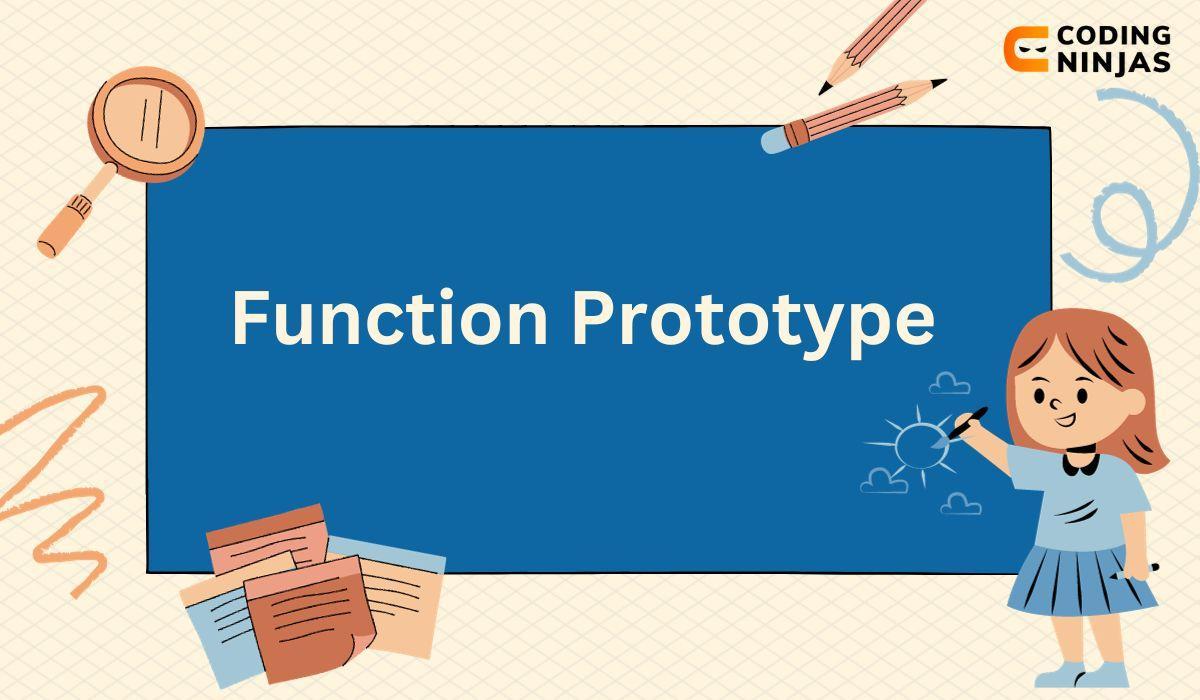Why use function prototypes?
-
Early Declaration: Function prototypes allow you to declare the function signature (return type, name, and parameters) before its actual implementation in the code. This informs the compiler about the existence of the function and its interface.
-
Avoid Compilation Errors: Prototypes help prevent compilation errors that occur when a function is used before its definition. Without prototypes, the compiler might encounter calls to undefined functions during compilation.
-
Improves Readability: Prototypes serve as documentation, making the code more readable and understandable by providing a clear overview of the functions used in the program.
-
Enables Function Overloading: In languages that support function overloading, prototypes are necessary to distinguish between different overloaded functions based on their parameters.
What if the function prototype is not specified?
-
Implicit Declaration: If a function prototype is not specified, the compiler will implicitly assume the function signature during its first occurrence in the code. This default assumption typically assumes the function returns an integer and takes unspecified parameters.
-
Potential Bugs: Implicit declaration can lead to bugs if the actual function signature does not match the assumed signature. For instance, if the function actually returns a different type or takes different parameters, it can lead to undefined behavior or runtime errors.
-
Compiler Warnings: Some compilers may issue warnings when functions are used without a prototype. These warnings alert the developer about potential issues but do not prevent compilation.
-
Portability Issues: Code relying on implicit function declaration may encounter portability issues when compiled with different compilers or on different platforms. Different compilers may have different default assumptions for function signatures.
How to use a prototype?
To use a function prototype, follow these steps:
-
Declare the Prototype: Declare the function prototype at the beginning of your code or in a header file. The prototype includes the function name, return type, and parameter types, but it doesn't contain the actual function implementation.
-
Define the Function: Later in your code, define the function with the same name and matching parameters as specified in the prototype. The function's implementation contains the actual code for what the function does.
-
Call the Function: You can call the function anywhere in your code after declaring the prototype. The compiler knows the function's signature and can link the function call to its definition during compilation.
We have already seen an example in the previous section. You can refer to that to understand this better.
What if the function prototype is not specified?
When a function prototype is not specified, the compiler assumes a default function signature during compilation. This default assumption typically considers the function as returning an integer and taking unspecified parameters. However, this implicit declaration can lead to unexpected behavior and errors if the actual function signature does not match the assumed signature.
For example:
C
#include <stdio.h>
// Function definition
void greet(char *name) {
printf("Hello, %s!\n", name);
}
int main() {
// Function call without prototype
greet("Rahul");
return 0;
}

You can also try this code with Online C Compiler
Output
Hello, Rahul!
In this example, the greet() function is defined with a char* parameter and returns void. However, since no function prototype is specified before the main() function, the compiler makes an implicit assumption about the greet() function's signature. If the compiler assumes that greet() returns an int, it may generate incorrect code or issue a warning.
To avoid such issues, it's best practice to provide function prototypes before their first usage in the code. This informs the compiler about the function's signature and prevents potential errors or warnings related to implicit declaration. Here's how the code can be modified to include a function prototype:
C
#include <stdio.h>
// Function prototype
void greet(char *name);
int main() {
// Function call with prototype
greet("Rahul");
return 0;
}
// Function definition
void greet(char *name) {
printf("Hello, %s!\n", name);
}

You can also try this code with Online C Compiler
Benefits of Function Prototyping
- Prototypes save debugging time.
- When you compile with functions that haven't been declared, prototyping prevents difficulties.
-
When a function is overloaded, the prototypes determine which version of the function to call.
Also see Tribonacci Series and Short int in C Programming
Frequently Asked Questions
Q. Do you need function prototypes in C?
Yes, you should use function prototypes in C to declare functions before using them to ensure the compiler knows their signature.
Q. What is a function prototype in C?
In C, a function prototype is a declaration that specifies the function's name, return type, and parameter types without defining the function's actual code.
Q. What are function prototypes in C++?
In C++, function prototypes are similar to C but are often combined with class definitions, allowing you to declare member functions within a class without defining their implementation.
Q. What is the function signature in the function prototype?
A portion of a function prototype that includes the function's name and the type of its arguments is called a function signature.
Q. What is the input/output interlace about the function prototype?
The functions prototype specifies the input/output interlace to the function, i.e., what to give and what to expect from the function.
Conclusion
In this article, we have extensively discussed Function prototyping topics. Defining a function prototype in C helps save a huge amount of time in debugging. In overloading the function, prototypes help figure out which function to call in the given code, which helps avoid ambiguity and other programming problems.
We hope that this blog enhances your knowledge regarding Function prototyping. If you would like to learn extra, check out our articles on Understanding Functions. Do upvote our blogs to help other ninjas grow. Happy Coding!"






